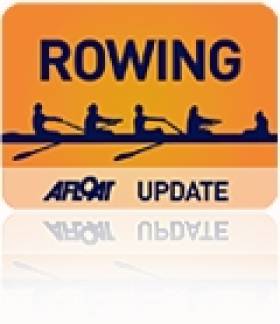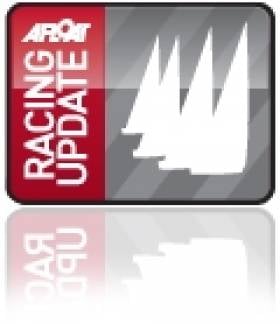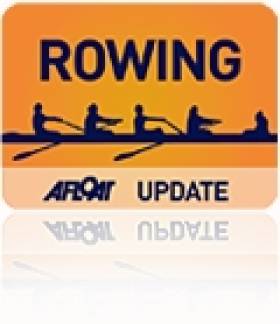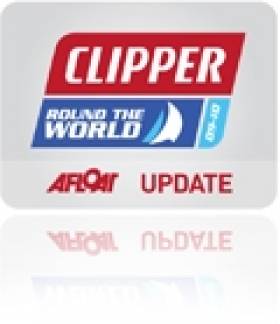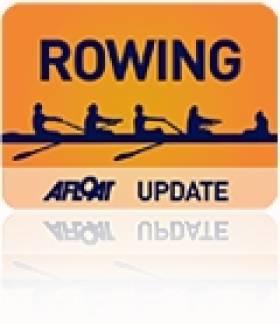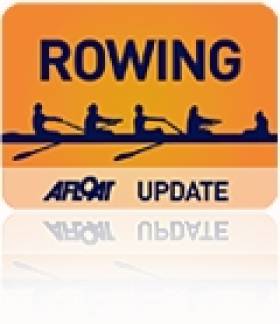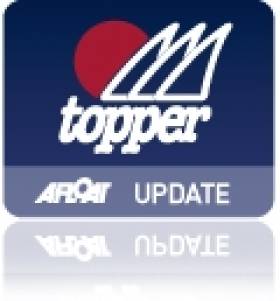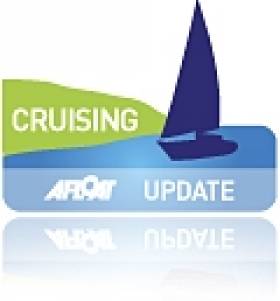Displaying items by tag: world
Walsh Fourth in Heat at World Under-23 Rowing
#ROWING: Denise Walsh of Ireland finished fourth in her heat of the lightweight single sculls at the World Under-23 Championships in Varese, Italy, this morning. The two direct qualification places were taken by Anna Ioannou of Cyprus and Julie Marechal of France, whose battle at the head of the race drew them away from the rest of the contenders. Britain’s Emily Craig was third, while Walsh and Anastasia Lebedeva of Russia fought it out at the back of the field to avoid last. The Skibbereen woman prevailed.
World Under-23 Rowing Championships, Varese, Italy, Day Two (Irish interest; selected results)
Women
Lightweight Single Sculls – Heat Three (First Two Directly to A/B Semi-Finals; Rest to Repechage): 1 Cyprus 8:04.62, 2 France 8:06.67; 3 Britain 8:13.89, 4 Ireland (D Walsh) 8:22.48, 5 Russia 8:26.00.
Nick Craig Reflects on Fourth OK Dinghy World Title
Nick Craig chats to Robert Deaves after his record-equalling fourth OK Dinghy World title
How times have changed. A little over seven years ago, no British sailor had ever won the OK Dinghy World Championship. It was a commonly held belief in the class that no British sailor ever would. They were just not up to the job, or jinxed by 50 years of history. Jim Hunt changed all that in 2004 with a decisive win on home ground at Parkstone on the UK's south coast.
Then it was Nick Craig's turn, winning the title in 2005, 2006 and 2007 to become only the third person to win three titles and only the second to win three in a row. This year in Largs, Scotland, Craig won it for a record equalling fourth time after one of the trickiest and closest world championships ever held.
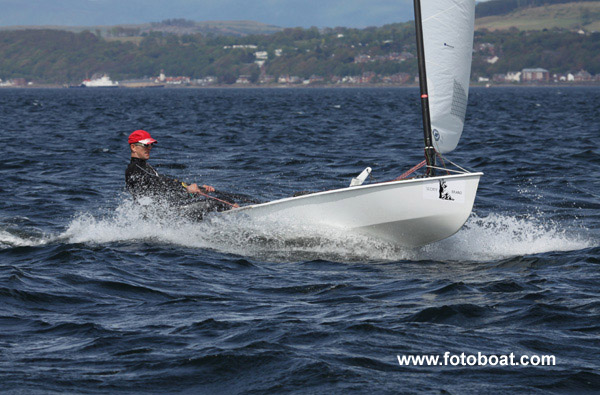
Craig joins Leith Armit (NZL), who won in 1983, 1985, 1990 and 1994, and Bo-Staffan Andersson (SWE) who won in 1988, 1991, 1992, 1993, as the only sailors to have won the title four times.
In addition, Craig rises to the top of the 'Best OK Dinghy sailors of all time' list, overtaking class legend Jørgen Lindhardtsen (DEN).
Several weeks after the win, Craig reflected on the regatta. It was not the easiest of weeks, plagued by light and unstable winds and unusually high temperatures. Only seven out of the ten scheduled races were held after several long days on the water with very little to show on the scoreboard.
Craig said, "However, it was a very well run event. On shore side, it was one of the best events I've done. The family and friends events were organised by Sue Byers. There were activities every day, which meant my wife and kids had a great time which is very important."
"It's just a shame the wind didn't play ball. The sailing was very challenging with light, unstable winds, but the race team made the best of it so we raced in the best conditions available."
What were his expectations going into it the regatta and how did that change during the week? "I was aiming to win but stayed pretty philosophical with the difficult conditions. I was sailing my best and if the wind was a bit random there wasn't a lot I could do about it. I didn't open the week well with a 16th and then an 11th in race three but I knew it would be high scoring so I just kept plugging away."
And the threats? "It was as expected – a great mix of experience in past World Champions Thomas Hansson-Mild (SWE) and Greg Wilcox (NZL) and new blood from Bartosz Rakocy (POL). In light winds I expected the German team to be fast which they were and in breeze the Aussies are fast."
After finding great speed in years past to win three world titles with his Celidh mast and North sail combination, Craig has struggled with speed issues in recent years, after the rest of the world caught up. And to some extent this still dogged him in Largs. "The biggest challenge was my lack of pace in the very light airs. I was just off the pace upwind in sub-hiking conditions, which made life very difficult on the big course. I was having to start very aggressively and get all the shifts right to get any decent results in these conditions."
The event had started on a low point for Craig. "My car, which was packed for the event and a two week family holiday, was stolen from the sailing club the weekend before the event and it made the week before very hectic with replacing the car, towbar, clothes, cot bed, credit cards and sailing kit as well as going to work. The biggest low point was how useless the police were – the thief phoned my wife on my phone so could easily have been caught."
And once into the racing, he didn't have the best start. "The opening race was pretty horrible for me. I got a great start but my pace was ordinary, I got on the wrong side of the last shift into the windward mark, and then got killed when the second reach turned into a run so I just scraped a 16th."
However the championship was still wide-open going into the seventh and final race, held right on the time limit. Craig, who was in fourth place overall, needed things to go his way. "The highlight of the event for me was the first beat of the last race. I got a bit lucky - there was a shift and new breeze on the left which I was in so I rounded the top mark first with none of my competition in the top 20."
"After that stroke of good fortune, it was still a tricky race. The wind stayed very light and I again struggled a bit for pace so slipped to fourth through the race whilst Greg Wilcox was coming through quickly. The run was painful as the leeward marks were moved to make it longer and the wind filled in from behind so at one point it looked like I'd be engulfed by the chasing pack. The fleet then inevitably split at the leeward gate but thankfully the wind filled in on my side so I clung on to take the title by just two points."
What does a fourth world title mean to him? "It means a lot – winning it this time round was in many ways a lot harder than any other time as I'm sailing less so it's harder to get an edge."
"The rigs have also moved on a lot over the last few years and I've been behind as I've been sailing other boats and doing less sailing. But I'm happy that I've now got a rig that works well across the wind range. I've got no edge though, so I'll be trying a few things over the winter to find that edge again."
Craig is without doubt an OK Dinghy fanatic, but sees the need for the class to promote itself in a crowded market. "The class needs to keep playing to its strengths of great international racing and low cost close racing in a good fun atmosphere. It is hard to promote that in the UK because it is a very crowded market and there are big companies promoting their boats hard. But the OK has a unique mix of enjoyable racing that should see it continue to thrive."
The class has lined up some great venues for the next few years. In 2012 the world championship is being held in Denmark, while in 2013 the class heads to Thailand for the first time, before travelling down under to Melbourne in 2014.
Craig is certainly game to try for a record fifth world title. "It would be fantastic and I will go for it, more because I love racing the OK Dinghy internationally than because five is a magic number. I hope to have many more years of great international sailing and beer drinking."
"But I know it will be hard. There is some great young talent coming through the class as well as some very experienced hands who are tough to beat."
Photo by Alan Henderson, fotoboat.com
Two womens' boats will compete for Olympic qualification, another is seeking Paralympics qualification and two boats are entered in non-Olympic world championship events.
The boats with ambition for Olympic qualification are the lightweight double scull of Claire Lambe and Siobhan McCrohan and the openweight women's double scull of Sanita Puspure and Lisa Dilleen.
With lightweight double sculls being the only boat class for lightweight women, the entry of 26 boats will generate intense competition for the eight Olympic places on offer this year. Lambe and McCrohan, who came fourth at last year's European championships, will be competitive for one of these Olympic places, but it will be very tight with any mistakes or errors making a dramatic difference in final results.
Similarly the openweight women's double scull has eight Olympic places on offer with 19 entries. The newly formed double scull is a partnership between Dilleen, a 20 year old from Galway, who came fourth in the World Junior Rowing Championships two years ago; and Sanita Puspure, a recently naturalised Irish citizen from Latvia. In 2003, Puspure was a bronze medallist for Latvia at under 23 level. The Irish pair finished fifth at the first World Cup earlier this summer in Munich, followed by an eleventh place in Lucerne.
For the first time, Ireland has a boat attempting qualification for next year's London Paralympic games in the form of a mixed coxed four crew in the legs, trunk, and arms (LTA) category. There are 16 entries with 8 qualifying. Ireland's boat finished fifth at the 2010 World Rowing Championships, and whilst the number of entrants has increased this year, the crew have a good chance of making the first eight to qualify.
Performance director Martin McElroy, an Olympic gold medal winning coach with the British team at the Sydney Olympics in 2000, said today, "Only our adaptive athletes went to the 2010 World Rowing championships. For all the others competing, it's a first time experience, and in an Olympic qualification year that's a big ask."
"When I started in my role as performance director in 2009, I knew we were missing a generation of athletes. A look at the age demographic of our team confirms that. However I am very pleased that we have a young ambitious group of athletes who are willing to take it on and it is not beyond the bounds of possibility that one or more of the boats may qualify. It's a big ask but it's not impossible. Added to that, we have a Paralympic boat seeking qualification for the first time"
The men's lightweight quadruple scull contains the same line-up that won a silver medal at the 2010 World Under-23 Rowing Championships. A strategic decision was taken to favour the non-Olympic boat class for these young athletes in order to continue their international development.
Performance director, Martin McElroy explained, "The choice was to risk immersing these young athletes in the cauldron of Olympic lightweight class boats which are amongst the most competitive classes in the Olympic regatta and create a very negative experience early in their careers, or take a more measured approach to their development and transition to the senior level through the non-Olympic boat classes."
"It was clear to us that we did not have a boat that would be close to qualification at this time and we discussed this openly with the squad. With 34 entries and only 11 to qualify, I'm satisfied that we've taken the right decision. These young athletes can compete positively in the quadruple scull event and continue taking the steps necessary to transition successfully from under 23 to senior."
Sarah Dolan a 21-year old Trinity college engineering student races in the women's lightweight single scull, an event with 22 entries.
Royal Navy to Start Clipper Race from Southampton
With one week to go until the gun fires to signal the start of the Clipper 11-12 Round the World Yacht Race, the first global event to set off from the Solent since 2004, organisers are thrilled to welcome the Royal Navy's helicopter carrier, HMS Illustrious, which will attend the weekend's festivities in Southampton, culminating in the race start on Sunday 31 July.
Ireland is represented by the City of Derry entry. The race will stop there in its course around the world.
At 40,000 miles Clipper 11-12 is the world's longest yacht race and almost 500 people from all walks of life and representing more than 40 nations will take part, putting their everyday lives on hold to take on the challenge of a lifetime. More than 40 per cent of them had no sailing experience before beginning their rigorous pre-race training.
Commanding Officer of HMS Illustrious, Captain Jerry Kydd, said, "HMS Illustrious is delighted to be in Southampton to support the start of the Clipper Round the World Yacht Race. The Clipper Race stands for much of what the Royal Navy and Royal Marines hold dear: personal determination and fortitude, in dangerous and demanding conditions, where teamwork, resilience and a winning spirit overcome any challenge the crews may face on their adventure. On behalf of the officers and crew of HMS Illustrious, I wish all yachts and their crews the very best of luck for a safe and fast circumnavigation and a cracking race!"
Founder and Chairman of the Clipper Race, Sir Robin Knox-Johnston, the first man to sail solo and non-stop around the world, said, "The Clipper Race has always had a very strong relationship with the Royal Navy and I am very pleased to welcome HMS Illustrious for the start of Clipper 11-12. She is part of the large maritime community of the south coast and I am very keen that as many members of that community as possible are able to enjoy this event which promises to be a quite spectacular sight."
Many boat owners and sailing enthusiasts will be joining the flotilla of spectator boats to watch the parade of sail in Southampton Water from 2.30pm – where the ten ocean racing yachts will sail in formation ahead of HMS Illustrious – before the race begins at 4.30pm from the historic Royal Yacht Squadron line.
HMS Illustrious will arrive in Southampton on Saturday 30 July and will be berthed at the QE2 Terminal. A raft of free, family friendly entertainment is taking place over the weekend in Ocean Village where the ten 68-foot yachts contesting Clipper 11-12 will be based. Live music will include sets by Southampton groups, Delays and Parade, as well as Toploader, who will headline on Friday night. As well as the live music on stage other entertainment in the Race Village will feature African dancers, acrobats, drummers and fire eaters plus a spectacular fireworks display on Saturday night.
Tens of thousands of people are expected to visit the race village between Thursday 28 July when the yachts arrive and Sunday 31 July when the teams will say an emotional farewell before setting off on their 12-month circumnavigation. The course will take them to 15 ports on six continents and across the largest and most ferocious expanses of water on the planet. Each of the colourful yachts bears the name of the city, region, country or company it represents.
Southampton City Council and MDL Marinas, owner of Ocean Village Marina where the yachts will be berthed, are working in partnership to host the Clipper 11-12 race start, the eighth edition of the event established by Sir Robin to give people from all walks of life the opportunity to take part in the life-changing experience of ocean racing.
As the official host port for the race start Southampton can expect a significant economic return from the tens of thousands of visitors expected to visit the city over the four days the fleet will be in Southampton, delivering millions of pounds worth of revenue for local businesses.
Queen's Man in World Rowing Quarter-Finals
Jonathan Mitchell qualified for the quarter-finals of the lightweight single scull at the World Under-23 Championships in Amsterdam. The Queen’s University man finished third in his heat, behind Germany and Sweden.
World Under-23 Rowing Championships, Amsterdam, Day Two (Irish interest):
Men
Lightweight Single Scull – Heat Six (First Three to Quarter-Finals): 1 Germany (R Acht) 7:47.10, 2 Sweden (O Russberg) 7:53.46, 3 Ireland (J Mitchell) 7:59.95; 4 Chile 8:03.41
The World Under-23 Rowing Championships, which begins on Wednesday in Amsterdam, have drawn a record number of 63 competing nations. Last year Ireland took a silver medal in the lightweight quadruple scull and we will be again represented in this class with Shane O’Driscoll and Peter Hanily coming into the crew for Mark O’Donovan and Michael Maher, who have moved out of this age group. Lisa Dilleen (20), who finished ninth in the single scull last year, gets another chance in this class. The lightweight double of Sarah Dolan and Claire Lambe and lightweight single sculler Jonathan Mitchell will also represent Ireland.
Ireland Team for World Under-23 Rowing Championships, Amsterdam, July 20th-24th
Men – Lightweight Quadruple: S O’Driscoll, N Kenny, P Hanily, J Ryan. Lightweight Single Scull: J Mitchell.
Women – Lightweight Double Scull: S Dolan, C Lambe. Single Scull: L Dilleen.
Dun Laoghaire Set for Topper World Champs
The club is expecting a turnout of up to 300 sailors that will make it the biggest dinghy sailing event in the country this year. "We will have a large contingent from the UK and many sailors from far away – we have had interest from Korea, Japan and Hong Kong, for example". Says Margaret Margaret Kneafsey, Chairperson of the Organising Committee.
Carlow sailor Finn Lynch, 16, who is the reigning British and Irish champion finished third in the 2010 World Championships in Lake Como, Italy.
The event has its own website with details on accommodation and logistics and entries.
Cruising Association Shocked by Fatal Shootings
Scott Adam was a member of the Cruising Association and was taking part in the round-the-world Blue Water Rally.
The Cruising Association is Britain's leading organisation for cruising sailors with members worldwide and works closely with government and other agencies to represent the interests of cruising yachtsmen including combating the menace of piracy.
"Our thoughts are with the family and friends of those who died", the statement ended.
Clipper Race Doc Goes Global on UK television
Six hour-long episodes capture every emotional twist and turn, high and low of the 35,000-mile race, following the participants in the ten-month-long challenge of a lifetime. Many of the crew had never set foot on a boat before beginning their pre-race training. From their first rookie steps to becoming a highly skilled ocean racer, the series charts their progress as they deal with the immense power of the world's oceans and everything Mother Nature can throw at them.
Dramatic footage captures a man overboard in the middle of the south Atlantic, dismastings, the devastating loss of a yacht and the terrifying experience of a yacht being rolled in the near hurricane conditions in the remote waters of the north Pacific. These heart-stopping scenes combine with the euphoria of race victories, personal voyages of discovery and the cementing of friendships that will last a lifetime.
As the race draws to its final, nail-biting conclusion and the emotional homecoming to a hero's welcome, Against the Tide captures the reactions of the racers after the event, to discover exactly how this unforgettable experience has changed their lives forever.
The international TV series, created by an award winning UK production team, is being snapped up by broadcasters around the world, including the Discovery Channel. The programmes will premiere on Discovery's UK free-to-air channel QUEST in a peak mid-week slot from next Wednesday, 2 March at 9pm.
TV series Producer John Nolan says, "The Clipper Race is a remarkable human adventure played out on the high seas. Our team had unrestricted access to the crews to follow their incredible journey around the world. The series provides a unique insight into the roller coaster of emotions and experiences as novice sailors from all walks of life discover how they cope when Mother Nature throws everything she's got at them.
"We're delighted with the programmes and have received an enthusiastic reception from broadcasters such as Discovery Channel. It will be seen by millions of viewers around the world."
The biennial race was established in 1996 by legendary yachtsman Sir Robin Knox-Johnston, who became the first person to sail solo, non-stop, around the world more than 40 years ago. He is chairman of the race which is almost full for the next event starting this summer and is already signing up crew for 2013.
Sir Robin says, "There is huge demand for this unique adventure which gives people of all ages and walks of life the opportunity to experience the thrill of ocean racing, Clipper provides extensive training and safety is our number one priority. So when our crews and their professional skippers encounter the dramatic challenges of the world's oceans, they can call upon their training and numerous safety drills to respond quickly and effectively. Taking part in the Clipper Round the World Yacht Race is a great personal achievement of which they can be justly proud and the television series captures it perfectly."
Watch Against the Tide on QUEST (Freeview channel 38, Sky channel 154, BT Vision channel 38, Virgin Media channel 179) from Wednesday 2 March at 2100 GMT.
The series has been produced by North One Television, one of Europe's biggest and most successful independent media companies. It is recognised as a global producer of world class entertainment, factual, digital, sport and live event programming and has won scores of awards for its shows. It is part of the ALL3MEDIA group. www.northonetv.com



























